| Listing 1 - 10 of 57 | << page >> |
Sort by
|
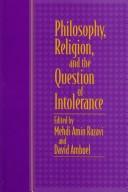
ISBN: 0585063443 9780585063447 0791434478 0791434486 9780791434475 9780791434482 0791494756 9780791494752 Year: 1997 Publisher: Albany State University of New York Press
Abstract | Keywords | Export | Availability | Bookmark
 Loading...
Loading...Choose an application
- Reference Manager
- EndNote
- RefWorks (Direct export to RefWorks)
Philosophy, Religion, and the Question of Intolerance is a diverse collection of essays united by a common starting point and theme - the awareness that intolerance is a phenomenon encountered in diverse places and circumstances and often handled with limited success. The question of toleration, together with its cultural, social, religious, and philosophical implications are addressed by leading authorities who offer insights from an interdisciplinary perspective.
Toleration. --- Bigotry --- Intolerance --- Tolerance --- Virtues --- Discrimination
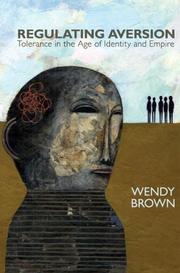
ISBN: 9780691136219 9780691126548 0691126542 0691136211 Year: 2006 Publisher: Princeton Princeton university press
Abstract | Keywords | Export | Availability | Bookmark
 Loading...
Loading...Choose an application
- Reference Manager
- EndNote
- RefWorks (Direct export to RefWorks)
Brown's analysis of the history and contemporary life of tolerance reveals it in a startlingly unfamiliar guise. Heavy with norms and consolidating the dominance of the powerful, tolerance sustains the abjection of the tolerated and equates the intolerant with the barbaric. Examining the operation of tolerance in contexts as different as the War on Terror, campaigns for gay rights, and the Los Angeles Museum of Tolerance, Brown traces the operation of tolerance in contemporary struggles over identity, citizenship, and civilization.
Social ethics --- Human rights --- Toleration --- Bigotry --- Intolerance --- Tolerance --- Virtues --- Discrimination
Book
ISBN: 1003339042 877022207X 8770222088 100079668X 1000793168 Year: 2021 Publisher: Taylor & Francis
Abstract | Keywords | Export | Availability | Bookmark
 Loading...
Loading...Choose an application
- Reference Manager
- EndNote
- RefWorks (Direct export to RefWorks)
We are living today in a multicultural world, surrounded by people from different backgrounds, cultures and religions. Establishing tolerance and peace has become crucial. Without these qualities, social stability and communal harmony are threatened; and acceptance of each other remains elusive. Spreading a culture of tolerance and peace is necessary to address contemporary issues of world peace, this includes reflection on the importance of refusing violence and adopting a more peaceful means for resolving disagreements and conflicts. This book, written by the world’s foremost thinkers in this area, aims to increase feelings of openness and respect toward others, solidarity and sharing based on a sense of security in one's own identity and a capacity to recognize the many dimensions of being human in different cultural and social contexts. Topics discussed in the book include: Promoting Tolerance and Peace Teaching Tolerance and Peace Human Values Intercultural / Interreligious dialogue Human Fraternity document
Toleration. --- Bigotry --- Intolerance --- Tolerance --- Virtues --- Discrimination --- Society and culture: general
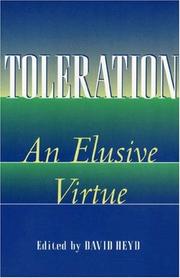
ISBN: 069104371X Year: 1996 Publisher: Princeton, N.J. Princeton University Press
Abstract | Keywords | Export | Availability | Bookmark
 Loading...
Loading...Choose an application
- Reference Manager
- EndNote
- RefWorks (Direct export to RefWorks)
Social ethics --- Legal theory and methods. Philosophy of law --- Toleration --- Bigotry --- Intolerance --- Tolerance --- Virtues --- Discrimination --- Toleration.
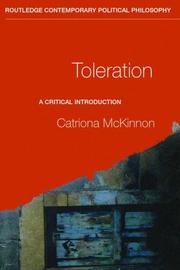
ISBN: 9780415322904 0415322901 9780415322898 0415322898 Year: 2006 Publisher: London Routledge
Abstract | Keywords | Export | Availability | Bookmark
 Loading...
Loading...Choose an application
- Reference Manager
- EndNote
- RefWorks (Direct export to RefWorks)
Why should we be tolerant? What does it mean to "live and let live"? What ought to be tolerated and what not? 'Toleration: A Critical Introduction' is a comprehensive and accessible philosophical introduction to toleration. The first part of the book clearly and coherently introduces and assesses the major theoretical accounts of toleration, examining toleration in light of challenges from skepticism, value pluralism and reasonableness. Catriona McKinnon also draws from those philosophers whose theories are central to toleration, from Locke and Mill to Rawls. In the second part of the book, McKinnon applies the theories of toleration to urgent contemporary problems such as female circumcision, the French headscarves affair, artistic freedom, pornography and censorship, and holocaust denial. 'Toleration: A' 'Critical Introduction 'provides a solid theoretical base to those who value toleration, whilst considering the challenges toleration faces in practice. It provides an ideal starting point for those coming to the topic for the first time, and anyone interested in the challenges facing toleration today.
Political philosophy. Social philosophy --- Toleration. --- Toleration --- Bigotry --- Intolerance --- Tolerance --- Virtues --- Discrimination
Book
ISBN: 9781139628860 9781107040328 9781107465237 1107465230 9781461945208 1461945208 1139628860 1107040329 1107461642 9781107461642 1139893122 9781139893121 1107459532 9781107459533 1107468744 9781107468740 1107472377 9781107472372 1107473306 9781107473300 1306072336 Year: 2013 Publisher: Cambridge
Abstract | Keywords | Export | Availability | Bookmark
 Loading...
Loading...Choose an application
- Reference Manager
- EndNote
- RefWorks (Direct export to RefWorks)
Political disputes over toleration are endemic, while toleration as a political value seems opposed to those of civic equality, neutrality and sometimes democracy. Toleration in Political Conflict sets out to understand toleration as both politically awkward and indispensable. The book exposes the incoherence of Rawlsian reasonable pluralist justifications of toleration, and shows that toleration cannot be fully reconciled with liberal political values. While raison d'état concerns very often overshadow debates over toleration, these debates - for example about terrorism - need not be framed as a conflict between toleration and security. Framing them in this way tends to obscure objectionable behaviour by tolerators themselves, and their reliance on asymmetric power. Glen Newey concludes by sketching a picture of politics as dependent on free speech which, he argues, is entailed by the demands of free association. That in turn suggests that questions of toleration are inescapable within the conditions of politics itself.
Toleration. --- Toleration --- Democracy --- Bigotry --- Intolerance --- Tolerance --- Virtues --- Discrimination --- Political aspects. --- Philosophy. --- Social Sciences --- Political Science
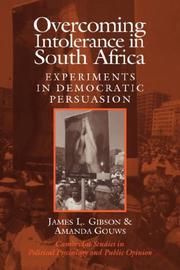
ISBN: 0521813905 0521675154 0511550332 0511826222 Year: 2003 Publisher: Cambridge : Cambridge University Press,
Abstract | Keywords | Export | Availability | Bookmark
 Loading...
Loading...Choose an application
- Reference Manager
- EndNote
- RefWorks (Direct export to RefWorks)
Overcoming Intolerance in South Africa investigates the degree to which the political culture of South Africa - the beliefs, values, and attitudes toward politics held by ordinary people - impedes or promotes the consolidation of democratic reform. One set of values is of particular concern in this study - political tolerance. The authors contend that political tolerance is a crucial element of democratic political cultures in general, but that in the South African case, tolerance is perhaps more important than any other democratic value. Since South Africa is one of the most polyglot countries in the world, the only viable strategy for survival is tolerance toward the political views of others. The overwhelming emphasis throughout this book is on finding ways to enhance the willingness of South Africans to 'put up with' their political enemies, to allow open and widespread political competition, and to coexist in their diversity.
Democracy --- Political culture --- Toleration --- Bigotry --- Intolerance --- Tolerance --- Virtues --- Discrimination --- Culture --- Political science --- Social Sciences --- Political Science
Book
ISBN: 9053526927 9789053526927 Year: 2001 Publisher: Amsterdam Boom
Abstract | Keywords | Export | Availability | Bookmark
 Loading...
Loading...Choose an application
- Reference Manager
- EndNote
- RefWorks (Direct export to RefWorks)
In deze tijd lijkt de grens tussen tolerantie en onverschilligheid te vervagen. Bekende publicisten, filosofen, juristen, historici en sociologen denken in dit boek na over een minder vrijblijvende, minder 'lege' tolerantie.Zo schetst men diepgaand de geschiedenis van de tolerantie en geeft men een filosofische beshouwing over het tolerantiebegrip, waarbij een eigen stellingname niet geschuwd wordt. Het deel 'Tolerantie in discussie' bevat een reeks korte artikelen, soms polemisch, dan weer beschrijvend van aard, waarin het onderwerp vanuit een caleidoscopisch oogpunt wordt belicht. Het boek wordt afgesloten met een korte slotbeschouwing waarin men over de betekenis van tolerantie in deze tijd en over de politieke implicaties enkele conclusies trekt.
-Bigotry --- Liberty --- Toleration --- Civil liberty --- Emancipation --- Freedom --- Liberation --- Personal liberty --- Democracy --- Natural law --- Political science --- Equality --- Libertarianism --- Social control --- Bigotry --- Intolerance --- Tolerance --- Virtues --- Discrimination --- Netherlands --- Social conditions. --- Liberty. --- Political philosophy. Social philosophy --- Social ethics --- Sociology of culture
Book
ISBN: 178093999X 1780932391 1780932863 1472544730 9781780932866 9781780932859 1780932855 9781780932392 9781780939995 9781472544735 Year: 2014 Publisher: London, England : Bloomsbury Academic,
Abstract | Keywords | Export | Availability | Bookmark
 Loading...
Loading...Choose an application
- Reference Manager
- EndNote
- RefWorks (Direct export to RefWorks)
"Over the past 15 years, Rainer Forst has developed a fundamental research programme within the tradition of Frankfurt School Critical Theory. The core of this programme is a moral account of the basic right of justification that humans owe to one another as rational beings. This account is put to work by Forst in articulating - both historically and philosophically - the contexts and form of justice and of toleration. The result is a powerful theoretical framework within which to address issues such as transnational justice and multicultural toleration. In this volume, Forst sets out his ideas in an extended essay, which is responded to be influential interlocutors including: Andrea Sangiovanni, Amy Allen, Kevin Olson, Anthony Laden, Eva Erman and Simon Caney. The volume concludes with Forst's response to his interlocutors".
Justice (Philosophy). --- Justification (Ethics). --- Toleration. --- Justice (Philosophy) --- Justification (Ethics) --- Toleration --- Philosophy & Religion --- Philosophy --- Bigotry --- Intolerance --- Tolerance --- Ethics --- Virtues --- Discrimination --- Democracy
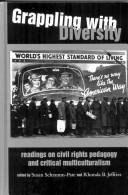
ISBN: 1435658795 9781435658790 0791473279 Year: 2008 Publisher: Albany State University of New York Press
Abstract | Keywords | Export | Availability | Bookmark
 Loading...
Loading...Choose an application
- Reference Manager
- EndNote
- RefWorks (Direct export to RefWorks)
Multicultural education --- Education --- Cultural pluralism --- Toleration --- Social Sciences --- Education, Special Topics --- Bigotry --- Intolerance --- Tolerance --- Virtues --- Discrimination --- Curricula
| Listing 1 - 10 of 57 | << page >> |
Sort by
|

 Search
Search Feedback
Feedback About UniCat
About UniCat  Help
Help News
News